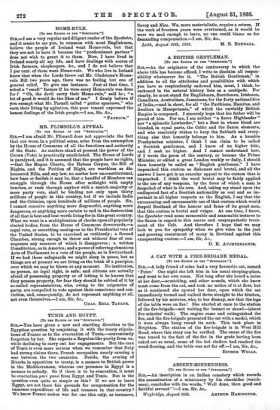A BRITISH GENTLEMAN.
[To THE EDITOR OP THE "SPECTATOR."] SIR,—As the originator of the controversy to which the title has become affixed, I write to disclaim all respon- sibility whatsoever for it. "The British Gentleman," in addition to all the attributes and possibilities with which you have so resplendently endowed him, must, I think, be- reckoned in the natural history lists as a centipede. For clearly, he must stand for Englishmen, Scotchmen, Irishmen, Canadians, Australians, Jamaicans, for the forty nationalities of India,—and in short, for all "the Parthians, Hamites, and dwellers in Mesopotamia," of which the unwieldy British Empire is composed. I sincerely hope that his father will be proud of him. For me, I am neither " a fierce Highlander " nor " a splenetic Lowlander," but a Scot in whose blood are blended, in equal parts, the Celtic and the Saxon elements, and who resolutely wishes to keep the Sabbath and every- thing else that honestly belongs to him. As a humble Presbyterian minister, I think I can claim to be called a Scottish gentleman, and I know of no higher title, and I seek no higher. And I cannot understand how, if I wrote the poem of the century, or became the Prime Minister, or edited a great London weekly or daily, I should then honestly be called an " English gentleman." I have impeached this custom as dishonest and brutal, and all the answer I have got is an oracular appeal to the custom that is impeached. I think the word brutal may be fairly applied to the use of any weapons, by the force of which a man is despoiled of what is his own. And, taking my stand upon the undisputed fact of a Scottish nationality as real and as im- portant in all higher respects as the English, I say that the unreasoning and unreasonable use of that custom which would despoil Scotland of the honour and fame of its great men, that this custom is brutal and vulgar. At one time, I know, the Spectator read some memorable and seasonable lectures to the Saxon in regard to this coarse and unsympathetic treat- ment of the Celt. And therefore I hope that we may look to you for sympathy when we give voice to the just and growing resentment of many in Scotland against this. exasperating custom.—I am, Sir, &c., D. K. AITCHTERLONIE.


































 Previous page
Previous page